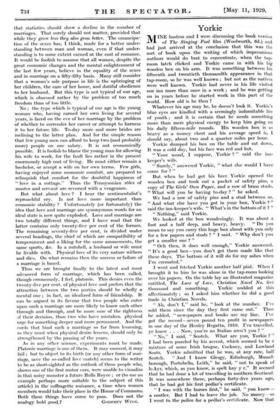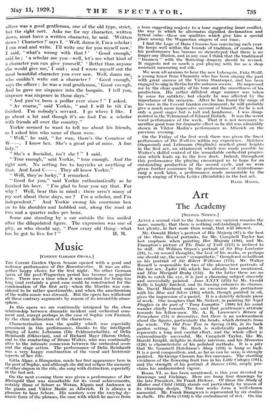Yorkie
MINE hostess and I were discussing the book version of The Singing Fool film (Woolworth, 6d.) and had just arrived at the conclusion that this was the sort of book upon the writing of which impecunious authors would do best to concentrate, when the tap. room latch clicked and Yorkie carne in with his big wooden box on his arm. It was something between his fifteenth and twentieth thousandth appearance in that tap-room, so he was well known ; but not as the natives were well known. Yorkie had never in his life visited our inn more than once in a week ; and he was getting on in years before he started work in this part of the world. How old is he then ?
Whatever his age may be, he doesn't look it. Yorkie's blue eyes are kindled with a seemingly indomitable fire of youth ; and it is certain that he needs something more than mere physical energy to keep him going on his daily fifteen-mile rounds. His wooden box is as heavy as a money chest and his average speed is, I should say, about two and a quarter miles per hour.
Yorkie dumped his box on the table and sat down. It was a cold day, but his face was red and hot.
" Your usual, I suppose, Yorkie ? " said the inn- keeper's wife.
" Surely," answered Yorkie, " what else would I have come for ? "
But when he had got his beer Yorkie opened the wooden box and took out a packet of safety pins, a copy of The Girls' Own. Paper, and a row of brass studs. " What will you be having to-day ? " he asked.
We had a row of safety pins and a stud between us. " And what else have you got in your box, Yorkie ? " said the inn-keeper's wife. " What's in the bottom of it ? "
" Nothing," said Yorkie.
We looked at the box wonderingly. It was about a foot and a half deep, and heavy, heavy. " Do you mean to say you carry this huge box about with you only for a few papers and studs ? " I said. " Why don't you get a smaller one ? "
" Och then, it does well enough," Yorkie answered. " It's a good box—you don't get them made like that these days. The bottom of it will do for my ashes when I'm cremated."
I went and fetched Yorkie another half pint. When I brought it to him he was alone in the tap-room looking over his papers. On the table lay an illustrated magazine entitled, The Lure of Love, Christian Novel No. five thousand and something. Yorkie nodded at this affectionately ; so I asked him whether he did a good trade in Christian Novels.
" Ah, don't I," said he, " look at the number. I've sold them since the day they first came out." Then he added, " newspapers and books are my line. I've got the record—seven pound ten profit in newspapers in one day of the Henley Regatta, 1919. I've travelled, ye know . . . Now, you're an Italian aren't you ? "
" No," I said, " Scotch. What are you, Yorkie ? I had been puzzled by his accent, which seemed to be a mixture of some Irish brogue, Cockney, and Lowland Scots. Yorkie admitted that he was, at any rate, half Scotch. " And I know Glesgy, Edinburgh, Mussel- borough, Portobello, Leith," he said, " not to speak of h-Ayr, which, as you know, is spelt hay y r." It seemed that he had done a lot of travelling in southern Scotland. It was somewhere there, perhaps forty-five years ago, that he had got his first pedlar's certificate.
" I was with the horses first," he said, " you know— a nostler. But I had to leave the job. No money—so I went to the police for a pedlar's certificate. Now that officer was a good gentleman, one of the old type, strict, but the right sort. Asks me for my character, written down, must have a written character, he said. 'Written down ! Character !' says I. ' Well, damn it, I'm a scholar : I can read and write. I'll write one for you myself now,' I said, ' what's wrong with that ? " Good enough,' said he ; ' a scholar are you—well, let's see what kind of a character you can give yourself.' Better than anyone else would give me,' I said ; and I wrote myself out the most beautiful character you ever saw. Well, damn me, who couldn't write out a character ? Good enough,' says the officer ; he was a real gentleman, Good enough. And he gave me sixpence into the bargain. I tell you, sixpence was sixpence in those days."
" And you've been a pedlar ever since ? " I asked.
" Av course," said Yorkie, " and I will be till I'm finished. I'm nobody's servant. I go where I like. I go about a lot and though it's on foot I'm a scholar with friends all over the country."
Yorkie seemed to want to tell me about his friends, so I asked him who some of them were.
" Well," he said, " for wan, there's the Countess of IV . I know her. She's a great pal of mine. A fine lady."
" She's a Socialist, isn't she ? " I said.
" True enough," said Yorkie, " true enough. And the right sort. No setting fire to hayricks or anything of that. And Lord C . They all know Yorkie."
" Well, they're lucky," I remarked.
" Good for you," said Yorkie enthusiastically as he finished his beer. " I'm glad to hear you say that. For why ? Well, bear this in mind : there aren't many of my sort about these days, see ? I'm a scholar, and I'm independent." And Yorkie swung his enormous box on to his shoulder and hobbled out, along the road at two and a quarter miles per hour.
Some one standing by a car outside the inn smiled after the dilapidated figure. The expression was one of pity, as who should say, " Poor crazy old thing—what











































 Previous page
Previous page